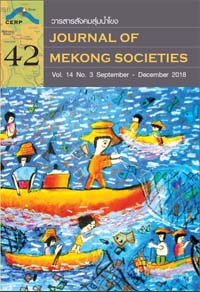Obstacles to Conflict Transformation in Myanmar: A Case Study of the Ta’ang National Liberation Army
Main Article Content
Abstract
This article addresses the problem of ethnic conflict transformation in Myanmar by considering why the civil government could not convince all Ethnic Armed Groups (EAOs) to participate in the peace process and sign the National Ceasefire Agreement (NCA). These dynamics are examined through a comparison of the political life cycle of the Ta’ang, drawing from documentary data and ethnographic research. It argues that the problem of the current peace negotiations between the government and the Ta’ang National Liberation Army (TNLA) is rooted in the civil government’s inability to control the Myanmar army, especially its operations regarding the control of ethnic groups, which led to a lack of trust among all concerned. More importantly, it shows how civil-military relations in the domestic politics of Myanmar affect the resolution to the ethnic conflict. While the government is attempting to use political means, the army focuses only on military operations. It could be said then that this unfinished democratization changes the pattern of ethnic conflict to something akin to “talking while fighting.”


